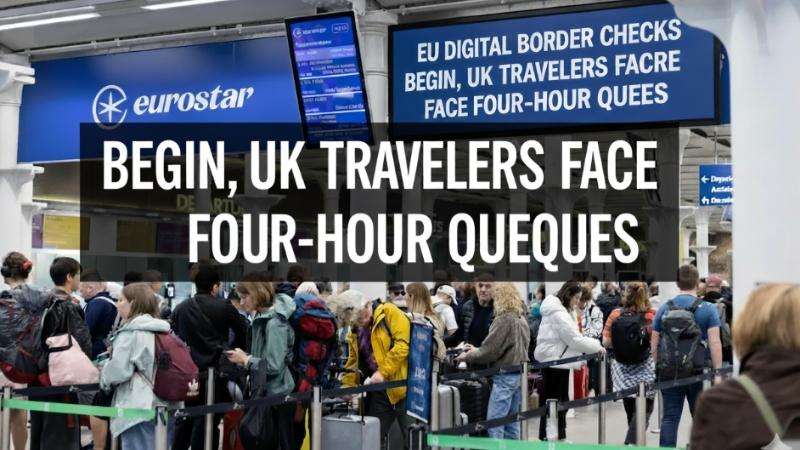UK travellers planning trips to Europe's Schengen area this weekend are being strongly advised to brace for significant delays, with some experts warning of potential four-hour queues at border controls. The alarm has been raised as the European Union's new digital Entry-Exit System (EES) begins its phased rollout this Sunday, replacing the traditional manual stamping of passports.
The EES is an automated system designed to register non-EU nationals, including UK citizens, each time they cross an external EU border for a short stay. On their first entry after the system is introduced, travellers will be required to provide biometric data, including fingerprints and a photograph, alongside their passport scan. This information will be stored for three years.
Anticipated Delays at Major Hubs-The immediate concern is the initial implementation of the system, which experts fear could lead to bottlenecks. Julia Lo Bue-Said, chief executive of Advantage Travel Partnership, advised travellers visiting major airports in southern Europe to "allocate four hours for navigating the new system in these initial stages." She warned of "potentially overwhelming volumes of travellers during the initial roll-out," though she expects procedures to "settle over the next few weeks."
Consumer magazine Which? Travel editor, Rory Boland, echoed the concern, stating, "Longer waits are expected at border control on arrival so you should allow more time when you land by booking later transfers or other onward travel."
While the Home Office suggests the extra biometric checks "should only take one to two minutes" per person, they concede this may lead to "longer waits at busy times."
Preparations at UK-EU Crossings-For those travelling via sea and rail, the checks will be completed in the UK by French border officials. This applies to passengers boarding international services from London’s St Pancras railway station, the Port of Dover, and Eurotunnel’s Folkestone terminal.
Transport operators have been making significant preparations. Eurostar has reportedly doubled the number of staff at St Pancras and installed 49 electronic EES kiosks (up from an originally planned 24) to manage the flow. The Port of Dover has invested £40 million, and Eurotunnel operator Getlink has spent £70 million, in preparation for the new system. Furthermore, the UK Government has signed contracts for two sites in Kent to hold overflow traffic should severe queues occur.
However, the rollout is gradual. The EU is introducing EES in a phased manner until full implementation is required by April 10 next year. Initially, only some passengers will be required to use the new kiosks at UK locations. Ports also retain the ability to suspend EES checks temporarily to manage significant backlogs, a contingency measure described by the Port of Dover as a "Cry Wolf" button.
Despite industry preparations, awareness remains a concern. A recent survey by the Association of British Travel Agents (Abta) found that just 51% of the public was aware of the EES changes.
Mark Tanzer, chief executive of Abta, maintained that in the long term, EES should "make processes quicker and simpler for travel to Europe." However, he acknowledged the short-term risk of "some delays, particularly at peak travel times," and urged countries to "remain vigilant" with contingency measures.
The EES is a core component of the EU's plan to modernise its borders, crack down on people overstaying their 90-day visa-free allowance within a 180-day period, and strengthen security. Travellers are urged to check the latest guidance before departure.








.svg)



